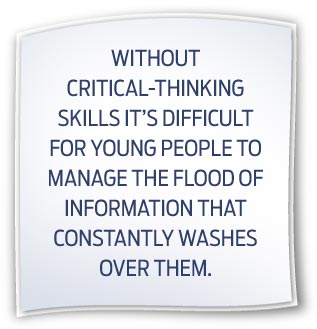
A New York University study released in 2011 followed college students nationwide and found that a full 45 percent of them weren’t learning the critical-thinking skills they needed to objectively consider information and make judgments about it in their first two years of college. During their last two years of college, 36 percent of students still hadn’t improved their ability to think critically.1
 Without critical-thinking skills it’s difficult for young people to manage the flood of information that constantly washes over them. The average American consumes more than 34 gigabytes of media information in their free time every day, according to a 2009 study by the University of California, San Diego.2 That’s enough video, music, and words to fit on about seven DVDs.
Without critical-thinking skills it’s difficult for young people to manage the flood of information that constantly washes over them. The average American consumes more than 34 gigabytes of media information in their free time every day, according to a 2009 study by the University of California, San Diego.2 That’s enough video, music, and words to fit on about seven DVDs.
So how are your kids processing all the information that enters their minds daily? It’s vital for them to think critically about it—filtering it through a biblical perspective to determine what’s true and what’s not. Proverbs 14:15 says: “The simple believe anything, but the prudent give thought to their steps.” If you teach your kids critical-thinking skills, you can help them make the wise decisions that God wants them to make.
Here are seven ways you can help your kids to learn how to think critically:
1Build on the right foundation. Do all you can to make sure your children are learning a biblical worldview. Read and discuss the Bible with them often. Help your kids understand God’s Word and how its principles relate to everything in life. Show them that God is the source of all wisdom, and encourage them to learn and apply His messages to their lives. Absorbing the Bible’s words into their souls will help your children to achieve the goal of critical thinking: distinguishing truth from falsehood and right from wrong.
2Don’t try to obsessively shelter your kids. Instead of attempting to keep your children totally away from the world’s harsh realities, talk openly and honestly about the sin in the world to help them see the need to learn how to make faithful decisions. Instead of isolating your children from exposure to people who don’t share your values, talk with them about how biblical values compare to other values, and encourage them to ask the difficult questions they need to ask to make their faith their own. Your children’s faith can grow stronger if they learn how to discern sin, love the sinner, resist temptation, and represent Jesus to everyone they encounter.
3Share regular conversations. Carve out small blocks of time throughout the day to talk together, such as while driving, during meals, and before bed. Discuss current events in the news and what’s going on in each of your lives. As you chat about various issues share your opinions, ask your kids to share theirs, and talk about whether you see biblical values reflected in what you’re discussing.
4 Encourage your kids to express their thoughts with confidence. Let your children know that what they think matters. Prompt your children to share what’s on their minds by asking them open-ended questions. Listen well when they talk to you—give them your full attention for as long it takes for them to fully share their thoughts.
Encourage your kids to express their thoughts with confidence. Let your children know that what they think matters. Prompt your children to share what’s on their minds by asking them open-ended questions. Listen well when they talk to you—give them your full attention for as long it takes for them to fully share their thoughts.
5Seek to guide, not control. Empower your children to learn how to think for themselves and make their own decisions. Allow them to express their opinions and tastes. Respect your children’s choices, even when you don’t agree with them. When your kids make mistakes, within reason, let them experience the consequences, reminding yourself that painful experiences are valuable opportunities for them to grow stronger characters. When your children succeed, rejoice with them. Have them set goals, and remind them of those goals without nagging. Ask thoughtful questions that help your kids determine what next steps would be wise. Let your children know that you’re committed to praying for them and encouraging them to make wise choices, but that you’ll love them no matter what choices they make in life. Don’t “rescue” your children from situations that can teach them about accountability, responsibility, and the consequences of their decisions. Teach them that even though life can be painful, they can find joy through God’s grace. Ask God to give you the wisdom to effectively balance freedoms and restrictions in your children’s lives in age-appropriate ways during each stage of childhood and the teen years.
6Help your children to make wise decisions about the media. Monitor their use of Web sites, television programs, movies, music, magazines, video games, and other media. Watch and listen together with them as often as possible, and talk with them about the content to help them learn to think critically about it. Discuss together specific ways that those stories either do or don’t fit into what the Bible—God’s story—tells them. Restrict media content that goes against your values. When choosing whether to allow your kids to consume a particular media message, ask whether doing so will make it easier for them to sin or to do something good for God. Explain to your children the specific reasons you don’t allow certain types of media content, and give them access to plenty of healthful media content that they can enjoy. Don’t restrict something just because you don’t like its style; restrict it only if its content is objectionable.
7Help your children to think critically about temptations they face. Explain the reasons it’s important for them to resist temptations to engage in such sinful activities as premarital sex, alcohol and drug use, and violence. Model the virtues that you want your kids to emulate in order to set a good example for them, and encourage them to come to you with questions so they can better think through the issues involved.
Teaching your children critical-thinking skills will help them to discover and live out the truth about Jesus, “in whom are hidden all the treasures of wisdom and knowledge” (Col. 2:3, NKJV).3
____________
1 Sara Rimer, McClatchy Washington Bureau, The Hechinger Report, “Study: Many College Students not Learning to Think Critically,” January 18, 2011. Available online at www.mcclatchydc.com/2011/01/18/
106949/study-many-college-students-not.html.
2 Global Information Industry Center, “How Much Information? 2009 Report on American Consumers,” December 2009. Available online at http://hmi.ucsd.edu/howmuchinfo_research_report_consum.php.
3 Texts credited to NKJV are from the New King James Version. Copyright © 1979, 1980, 1982 by Thomas Nelson, Inc. Used by permission. All rights reserved.
______________
Whitney Hopler is a full-time freelance writer living in Virginia. This article was published June 21, 2012.